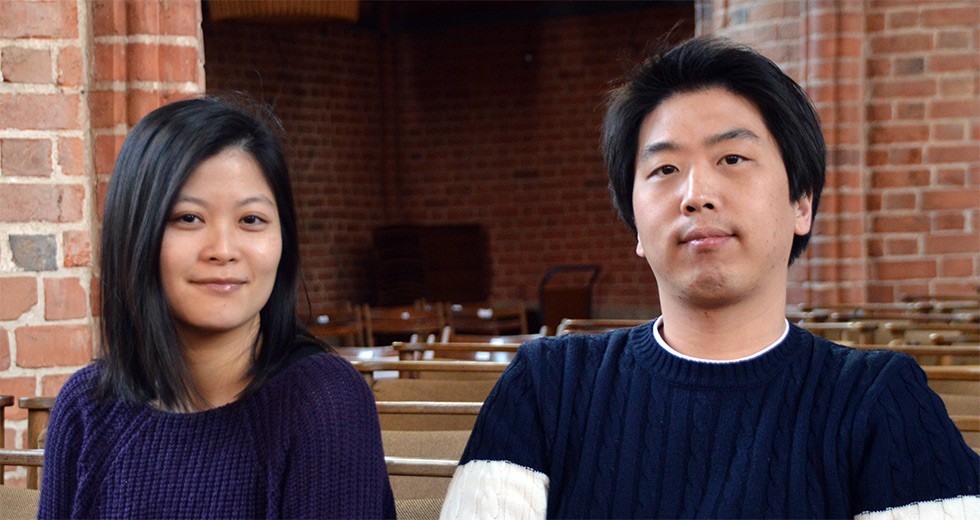Ecumenical relationships drive interns
Posted on March 29, 2016 by Phil Tanis

Despite differing approaches an interest in strengthening ecumenical knowledge and relationships drives both of the current interns at the World Communion of Reformed Churches (WCRC).
“My previous work experience has supplied me with knowledge about the local level of ecumenism,” says Lin Wan-Jou, who was the ecumenical youth programme assistant for the Presbyterian Church in Taiwan (PCT). Through this internship, she says, “I hope to learn to open the dialogue between churches, denominations and countries, to get to know the broader and deeper insights of ecumenism.”
Chung Doyoung, of the Presbyterian Church in the Republic of Korea (PROK), approaches ecumenism through a more academic framework: “Commonly, people regard that the ecumenical movement started in the 20th century, but actually the first ecumenical council was the Council of Jerusalem (Acts 15:1-29).”
He is planning on pursuing a Ph.D. on the ecumenical movement after his internship but also notes that, “The ecumenical movement begins with the human relationship. So I’d like to make many new and different kinds of connections to people around the world.”
Both have had a variety of ecumenical experiences. Most recently both were involved in the World Council of Churches 10th General Assemby, held in Busan, South Korea, in 2013. Doyoung worked on the PROK’s host committee while Wan-Jou led the PCT’s youth team exhibition and attended the pre-assembly youth meeting.
Their experiences in ecumenical activities have shown them the importance of bringing sisters and brothers in Christ together.
“For the Church today to communicate and commune with the world, the ecumenical movement is a necessity and not an option,” says Doyoung.
“We are one family in Jesus Christ. We Christians have to try to embrace each other in order to be one family,” says Wan-Jou. “When we open our arms to one another, it’s the moment that we open ourselves without defending and confronting others, waiting for responses—it could be blessings or even painful. When we close arms, hugging the other in our arms, this symbolizes that we permit the other into our lives.”
The pair have differing backgrounds. Doyoung is a third generation pastor while Wan-Jou is from a semi-Christian family.
“After elementary school, our family moved to Switzerland, because my father had been dispatched from the PROK as a pastor for the Korean community,” he says. His middle and high school years were spent in Bern. “I had in Switzerland a variety of multicultural experiences. And I think sharing between a variety of cultures, including religion, is very important today.”
“As my grandparents wished, I studied theology at university,” he continues. He was pleasantly surprised to find that he enjoyed and valued the subject. His year as an intern at the WCRC follows a year’s internship with his father’s current church, now near Hamburg, Germany, working with youth ministry.
Wan-Jou cites two factors in the development of her faith: being the eldest child in a family whose members are not all Christian.
“It’s a sweet burden being an oldest kid in the family,” she says. “And I also find the role of being the oldest in a family is exactly like the role as a Christian in Taiwan. When facing difficulties, we should stand out and take the responsibility to solve problems.”
“Coming from a semi-Christian family brings me a natural insight to see beyond controversy and conflict and try to find the very core of peace and justice in this diverse and chaotic world,” says Wan-Jou. “It also challenges my faith in God, but I’ve realized that this doubt is a path to believing in Him. And no matter how many times you challenge God, He will answer you with strong, firm, joyful confirmation.”
The lives of the two will be impacted through their work over the coming year. Both have already attended an ecumenical conference in Hungary and will be participating in a number of other international meetings and consultations, giving them exposure to the varied initiatives undertaken by the Communion. They will also have work to do in the WCRC’s head office in Hannover, Germany.
“Our internship programme is designed to provide experiences and enhance the knowledge of emerging leaders in our member churches, as well as bolster their commitment to ecumenism,” says Chris Ferguson, WCRC general secretary. “We’re delighted to have two such outstanding young adults with us this year, especially as we prepare for our upcoming General Council in 2017.”
The WCRC’s internship programme is funded primarily by a grant from the Evangelische Missionswerk (EMW) with additional funds contributed by the Presbyterian Church in Taiwan.
 World Communion of Reformed Churches
World Communion of Reformed Churches